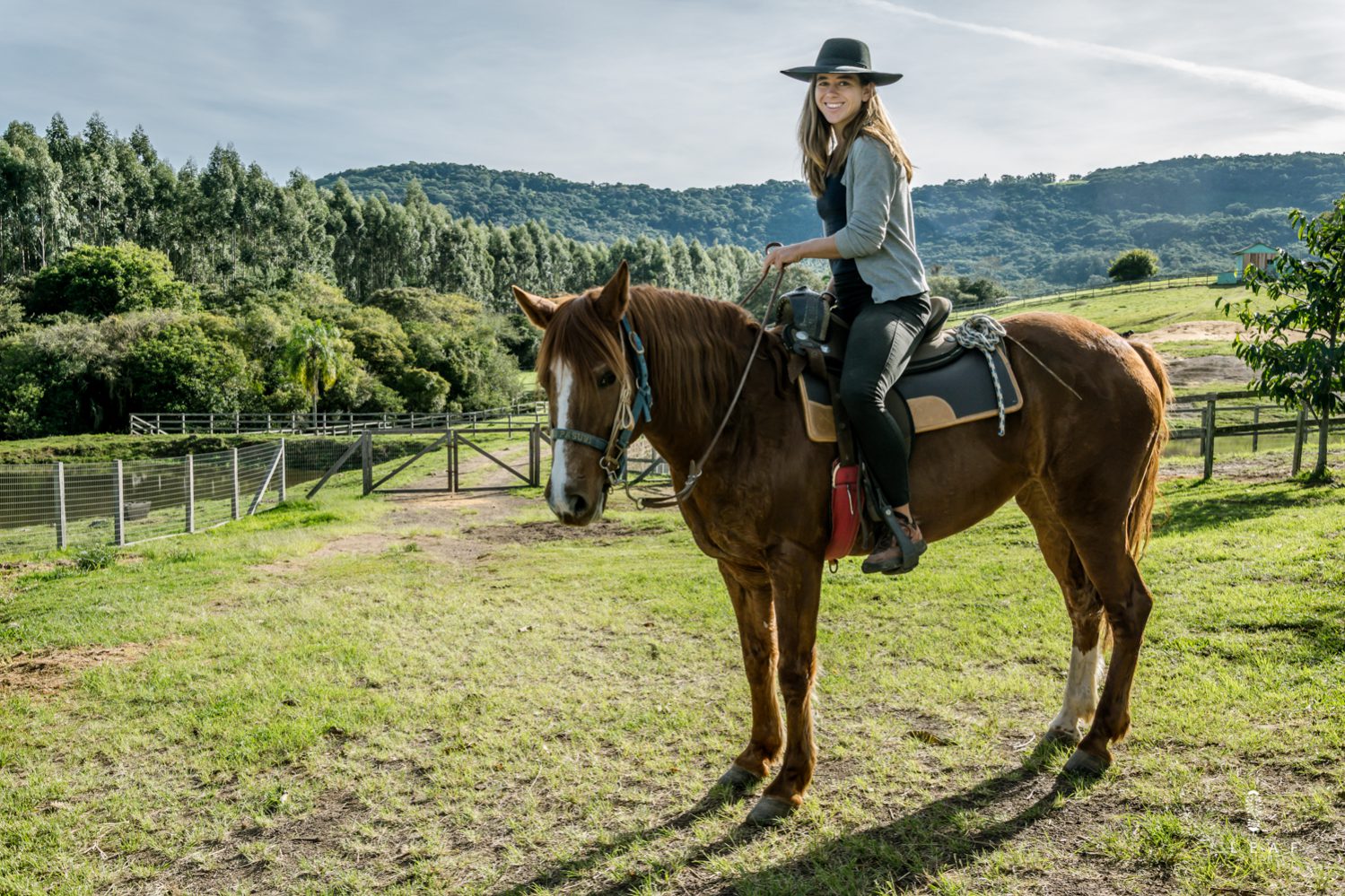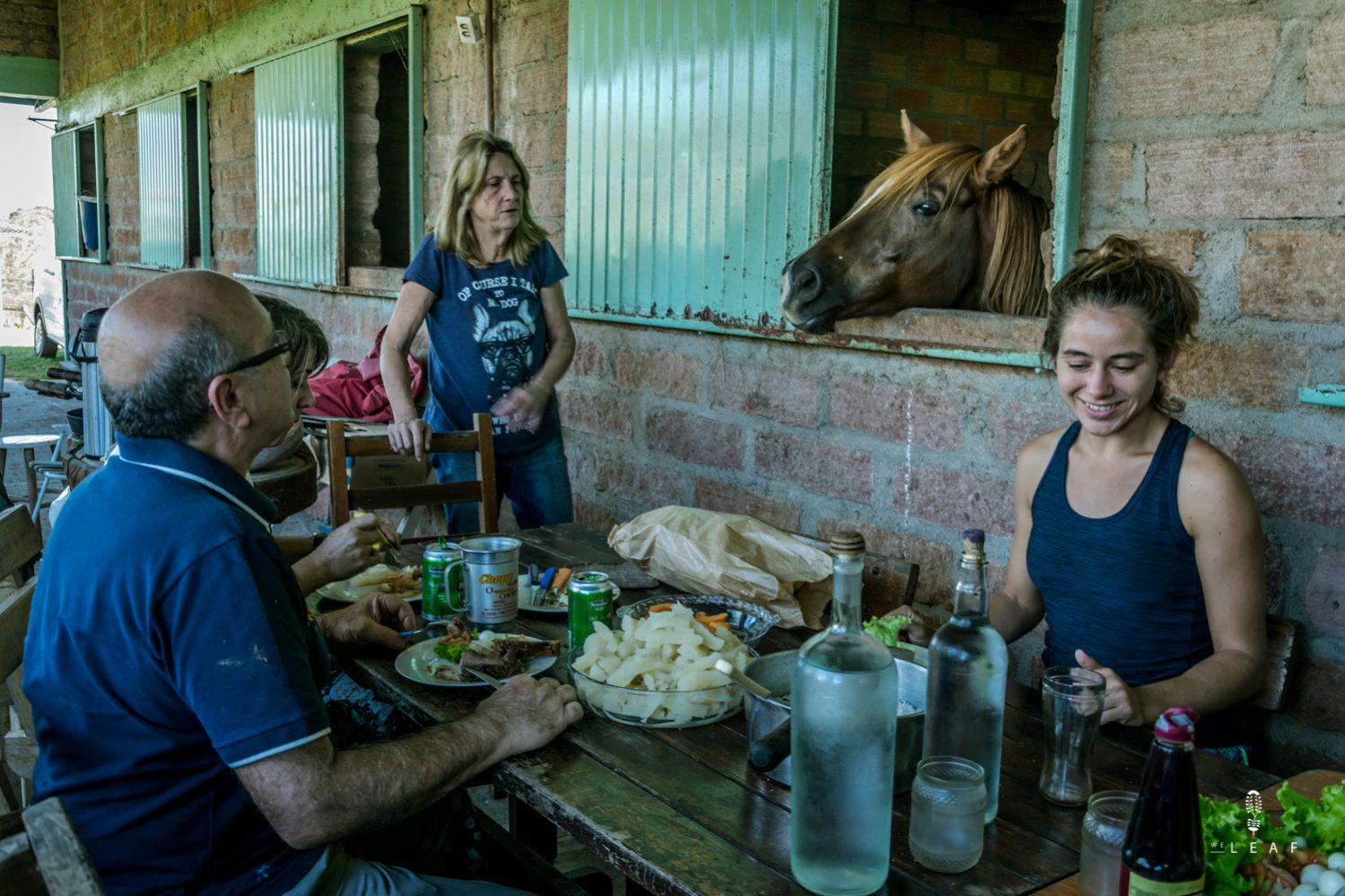
The stranger

The other side of Brazil
July 16, 2017
Paulo Silva
July 28, 2017
22 juni - bus terminal Porto Alegre
It is the start of expedition Patagonia. We are waiting at the bus terminal, after three days and nights in the bus our legs are surprisingly flexible. Carolina, our warmshower host pick us up by bicycle and while we cycle to her house she shows us around like a tour guide. She is an energetic lady, who cycles everyday along the favelas to her job. Her friends tell her she is crazy, so she is happy to show two even more crazy fellows. She takes us out for dinner and to the horserace track where jockeys fight for the golden medal. We get to know the world of horse racing, where rich and poor, owner and servant, need each other to get the horse in the right condition for a winners place. With eight horses at a time, the doors open and you can feel the sound of the hooves deep inside your body. It is spectaculair to see how the youngest jockeys with only 56 kilo manage the horses. We are just one feet away from the finish line and can feel the wind in our faces when the horses pass on there best speed.
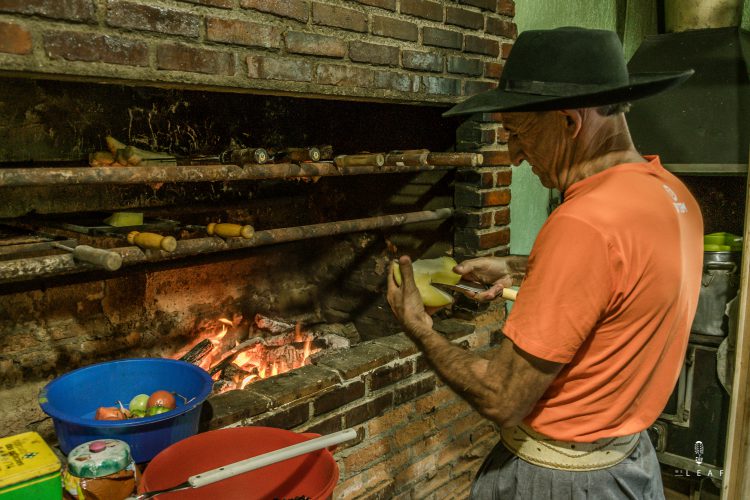
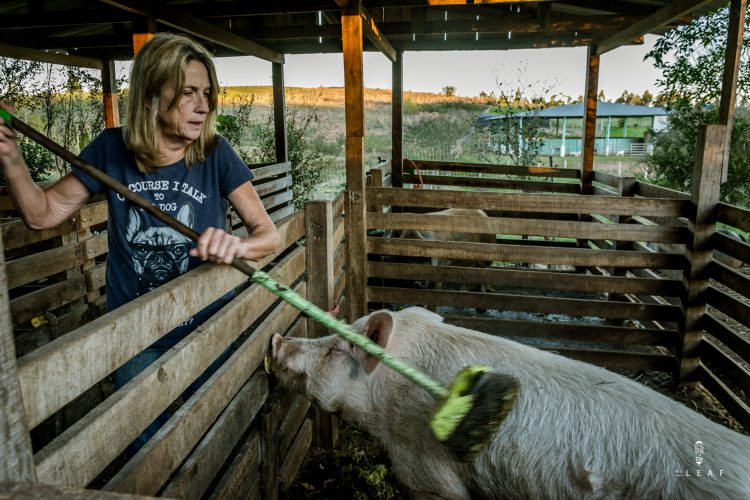
‘The land may be full of corruption, it is even fuller with hidden hearts, that are just to scared to open.'
We meet one of Caroline her 'angles'. Paulo, owner of racing horses, gaucho and one of Brazilians greatest Marathon athletes, invites us at his farm for the weekend. The fazenda counts sixty horses and together with the other bunch of chickens, goats, sheeps, cows, fishes, dogs and cats, it is a perfectly situated home in the soft green hills. The house is built on top of the stables, which makes it impossible to sleep closer to the horses breath. We feel home, while the farmers life never has been part of our education. All the greens and all the animals have their function in this little system. Cows for daily milk and cheese, home grown vegetables for a healthy animal life, chickens and pigs to clean up the organic leftovers and fish to feed the mouths. Words like 'organic', 'sustainable' or 'circulair' doesn't need to be explained here. It is the habit and logic of their existence. Paulo and Susan dip us into the culture of gauchos. We ride a horse, drink raw milk, help a little in the garden and stables and eat so much meat that we need to go on a meat diet for at least three weeks. A Brazilian costela is a huge piece of cow ribs, that is hold in a metal rack and put a meter away from a bonfire to sidder for a minimum of six hours. While we watch the fat dripping of, we drink maté, an extremely bitter thee dronken from a metal straw and passing every mouth, in a continue and fixed rhythm.
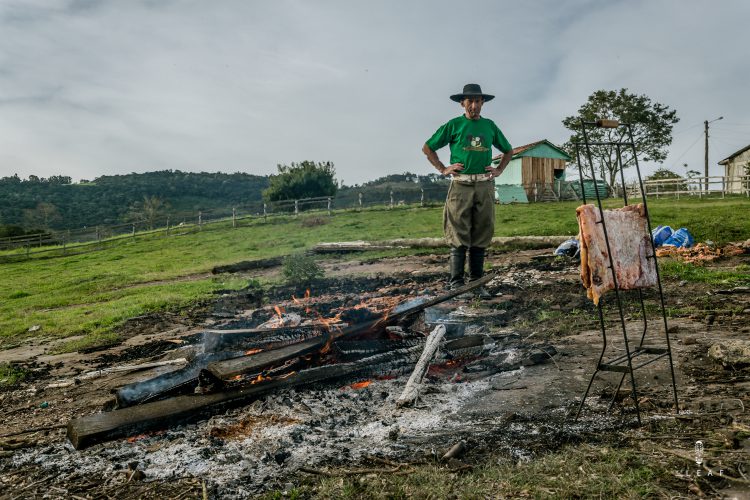
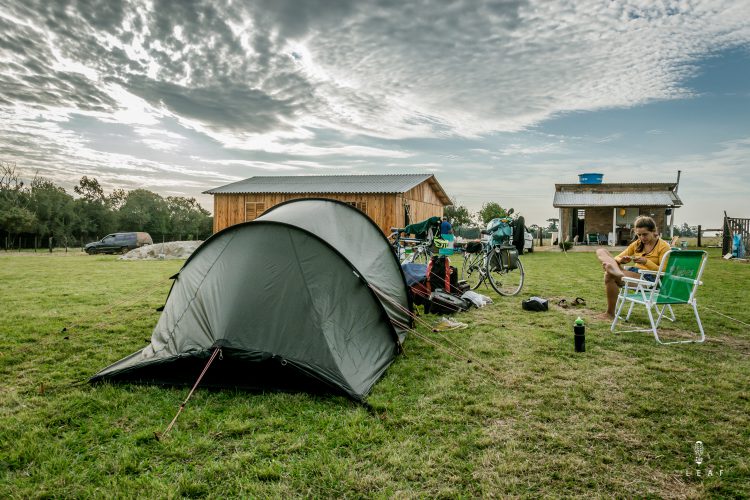
We arrived in the other side of Brazil. The North East, where we come from, and the South are extremes. Suddenly we cycle through the hilly landscapes of ‘Europe’, Curved roads make us forget the time and smiling sun shadows the cold nights. It is the right temperature to crawl deep into the down of sleeping bags, and wake up with cold hands and a healthy fresh nose. It is enjoyable, it is perfect, it is exactly that way that makes us perfectly happy. In the morning we break up our tent and say goodbye to our new friends, to find new ones after 80 kilometers, mostly on the top of a hill, where we pick a random house to ask if we could pitch the tent in their garden. It gives us the most beautiful experiences and friendships.
When we knock on the door of Maria Helena, to ask for a spot in the garden, she looks at us suspiciously, and even a bit of anger. 'Is that possible, with the tent in your garden?' we repeat because she might have understood us wrong. There appears a strange smile, that clearly expresses 'you two are crazy' while she waves us away to her neighbour. The gloomy property has been for sale for years and looks broken. We study the garden, are happy with our spot for the night and thank for the tip. She must have changed her mind while she turned away, because suddenly she offers a spot in her barn where it wil be warmer and we won’t suffer mosquito bites. We settle down and from this moment she comes and goes, but never without a careful practiced question or empty hands. She went out for shopping and brought us bread, bananas, snacks, cheese, ham, milk and yogurts. Unexpected she became a hostess, who even can’t understand the fact that Zoë already washed herself with a washcloth when she offers her shower. Until now she was a little nervous, but the next morning she comes with a tray of ‘café de manhã’ and serves us a cub of coffee and fires all her questions and curiosity at us.
Something has broken up, the distrustful and timid woman of yesterday sees that we are just normal people, that it is actually very nice with strangers and that she is doing something very special. Like we use to say in Dutch 'Who does good, meet the good’. Before we leave she offer us 50 reales, bread and a bag of take-away coffee. She don’t want us to reject her offer and we say a warm farewell. We didn’t tell Maria Helena, who built a relationship with two strangers, that we don’t like coffee.
Our second night isn’t either a direct succes, but we learn the tricks of the trade. We visit an old mining site which is currently protected by a foundation and converted into a rich piece of biodiversity. They don’t allow us to sleep in the garden because the boss is away. When the ‘padron’ is not at home, our question doesn’t has any value. Even when the question is asked by telephone, we don’t create any sympathy with the person on the other side of the line. A friendly smile, packed bicycles or a travel story doesn’t bother.
We miss another opportunity when we meet a dull enthusiastic farmer couple that lean themselves over the fens of their beautiful looking farm to chat with us. The man rattles incomprehensible words while the spittle flies out of his mouth when he laughs. The clue is clear, they are ‘just’ workers and the patron is away. Our next possibility is a little further away. He invites us directly in his chicken friendly garden, brings us folding chairs and shows us all the ‘camping’ facilities. He isn’t living on the terrain yet, since he is building his weekend house while he lives in the town. His twelve year old son is helping in the house and will learn forever to welcome strangers with open arms, like his dad did once. Here the man, today, still seems to be the one who has the first word. The next afternoon we request our spot in the garden at a hanging group of farmers. They all have a intense look at the one man who should answer the question. ‘Para mi es no problema’ is his word and we prepare the tent while the family shifts closer cautiously with curiosity and warm milk straight from the udders. The next morning we are peeling chestnuts at the fire place and leave when the sun is warm enough.
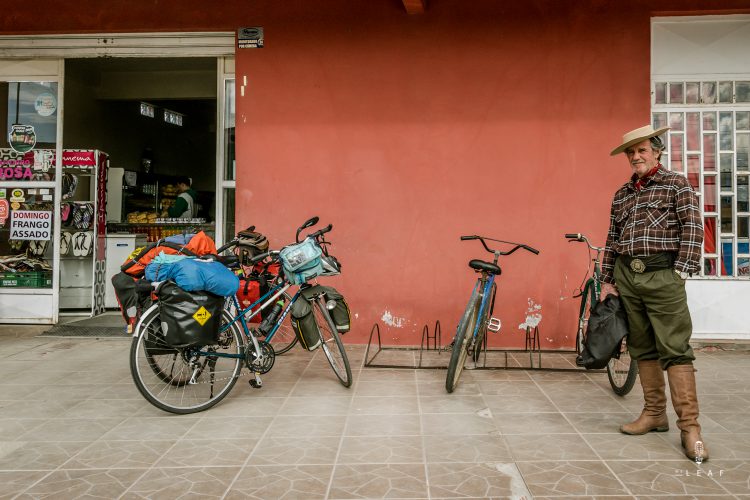
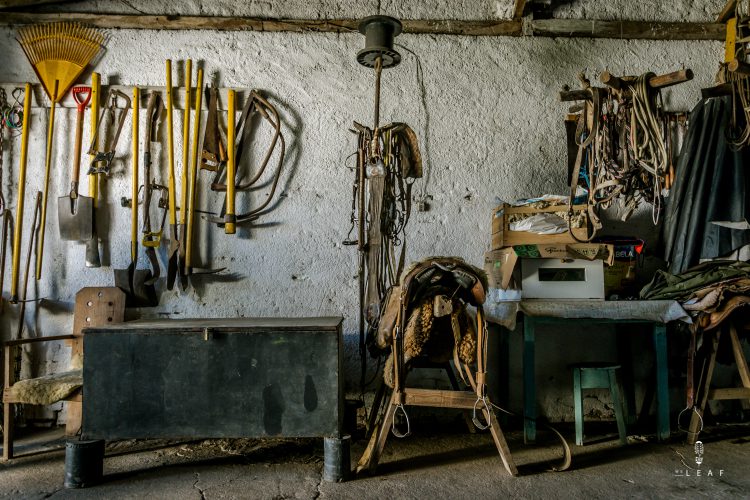
For some Brazilians, a stranger seems to be a direct reason for action. There are people who turn there car to give us a bag of bananas, or their last Argentinian money. It is their contribution to our journey and comes straight from the heart. Our nomadic existence is enough for them to support us without question or glance. We are strangers for them, but they are also strangers for us. It is inexpressible what the warmth of an unknown person can do. For both parties it is an enrichment to share, it is an experience, an emotion and a new friend. Fernando and Edison welcomed us without any doubt and said farewell with tears. We would never make it over the unpaved roads with our food stock to the next city, so sadly we need to change our route to a busy asphalt road to the nearest city. When we arrive, all the shops are closed. With best hope we wander around the city in hope for a little kiosk that might be open and when we ask Edison who is in his house with the front door open, he simply says 'Oh but we are cooking our lunch anyways, you guys wanna join?’ One lunch, become three nights and ‘a vontage’ is the known expressing of this friendly family. ‘Take it, we may eat as much as we want, sleep as long as we want and wash our cloths as often as we want. Fernanda is cooking cake, after pie, after bread for us and she is preparing the most delicious dinners. Edison, a physics and capoeira teacher, bring us to his classes and learn us everything about the classical combat dance.
We present our travel in his class and it doesn’t take long before we have a little fame in Cangucu. Quickly our faces cover all the Facebook pages and girls are giggling when we pass. In the end of our days with the family we have seen every corner of the city with many other visits like to the free masonry, gauchos family and farm where they sell breed sheep for 7000 euro. We feel thankful to see tears when we cycle away, up to the next unexpected.
When even a 13 year old receives us without permission of his dad who is away for work on the field, we are damn sure, that also Brazil has a special place in our heart. Although we know Brazil only from the news full of violence, drugs and murder, we have passed 2.000 kilometer by bicycle in the biggest cities and on the most isolated roads without a scratch. Luck? We think it doesn’t have to do with luck. The land may be full of corruption, it is even fuller with hidden hearts, that are just to scared to open. We thank all those who dared to open there armes and receive us.
The last hundred kilometers to the boarders are a straight line in the landscape. With a tiny back wind we cross over the wavy road. Hardly four hours later we are in front of the historical bridge that links with Uruguay. Tomorrow a new country, but first we find a new friend for our ultimate night.
[]
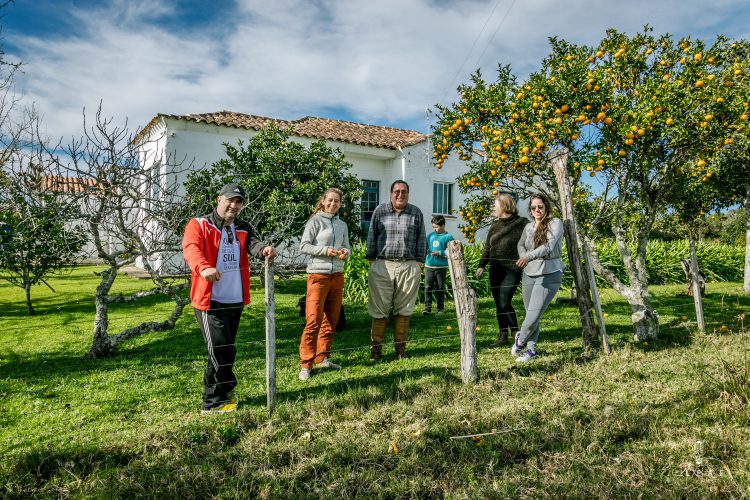
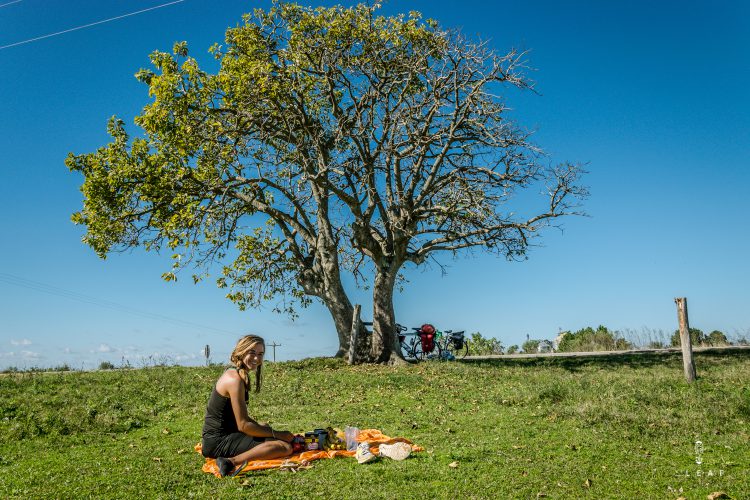
Frequently asked questions in Brazilië
- Are you married?
- Where are you children?
- Aren't you afraid to cycle in Brazil?
- Do you come from Argentina?
- How many kilometers do you cycle every day?
